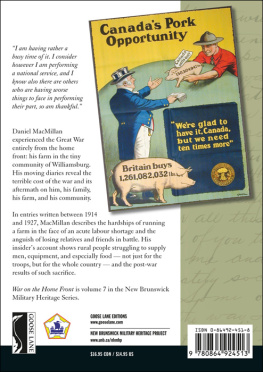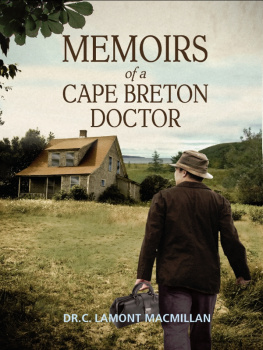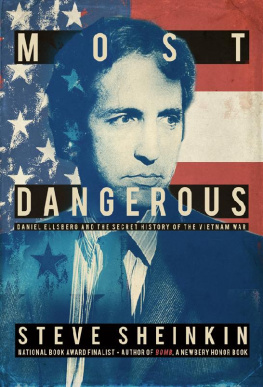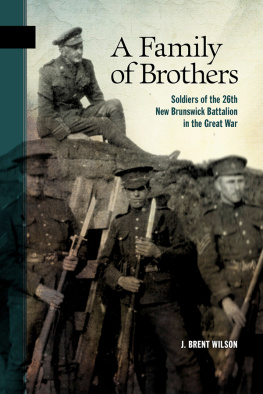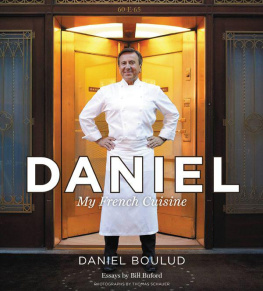War on the Home Front
The Farm Diaries of Daniel MacMillan, 1914-1927
The New Brunswick Military Heritage Series, Volume 7
War on the Home Front
The FARM DIARIES of DANIEL MacMILLAN,
1914-1927
Edited by BILL PARENTEAU
and STEPHEN DUTCHER
Diary copyright 2006 by Lorne Gallagher.
Introduction copyright 2006 by Bill Parenteau and Stephen Dutcher.
All rights reserved. No part of this work may be reproduced or used in any form or by any means, electronic or mechanical, including photocopying, recording, or any retrieval system, without the prior written permission of the publisher or a licence from the Canadian Copyright Licensing Agency (Access Copyright). To contact Access Copyright, visit www.accesscopyright.ca or call 1-800-893-5777.
Managing Editor: Brent Wilson
Cover illustrations: Front: (top) 6th Siege Battery bringing in German prisoners, October 1918 (NBM HWH F5-36); Haying, Kingsclear, early 1900s (PANB); Back: Canada Food Board poster (NBM). Cover and interior design by Julie Scriver.
Printed in Canada.
10 9 8 7 6 5 4 3 2 1
Library and Archives Canada Cataloguing in Publication
MacMillan, Daniel
War on the home front: the farm diaries of Daniel MacMillan,
1914-1927 / Bill Parenteau, Stephen Dutcher, editors.
(New Brunswick military heritage series; v. 7)
Co-published by the New Brunswick Military Heritage Project.
Includes bibliographical references and index.
ISBN 0-86492-451-8
1. MacMillan, Daniel Diaries. 2. Williamburg (N.B.) History 20th century.
3. World War, 1914-1918 New Brunswick Williamsburg. 4. Farmers New Brunswick Williamsburg Diaries. 5. Williamsburg (N.B.) Biography. I. Parenteau, Bill, 1959- II. Dutcher, Stephen Wayne,1959- III. New Brunswick Military Heritage Project. IV. Title. V. Series.
FC2499.W54W37 2006 971.55 C2006-900658-X
Goose Lane Editions acknowledges the financial support of the Canada Council for the Arts, the Government of Canada through the Book Publishing Industry Development Program (BPIDP), and the New Brunswick Department of Wellness, Culture and Sport for its publishing activities.
Goose Lane Editions
Suite 330, 500 Beaverbrook Court
Fredericton, New Brunswick
CANADA E3B 5X4
www.gooselane.com
New Brunswick Military Heritage Project
The Brigadier Milton F. Gregg, VC,
Centre for the Study of War and Society
University of New Brunswick
PO Box 4400
Fredericton, New Brunswick
Canada E3B 5A3
www.unb.ca/nbmhp
This book is dedicated to our families,
who support all of our endeavours.
Contents
Chapter One
A Great European War Has Broken Out
1914-1916
Chapter Two
Having a Difficult Time
1917-1918
Chapter Three
The Aftermath
1919-1927
Daniel MacMillan (1863-1960). Courtesy of Marion Burnett
Introduction
On March 22, 1923, on his sixtieth birthday, Daniel MacMillan sat down in his familys farmhouse in Williamsburg, York County, New Brunswick, to write in his diary as he had done faithfully for the past twelve years. Introspective by nature, MacMillan took this opportunity to reflect on his life. His thoughts floated back to the ambitions of his youth, when he dreamed of orchards I would plant, of the barns and stables I would build, of cows, of horses, sheep, pigs and poultry, I would have some day; of the new house, which we were then preparing to build, of ornamental and shade trees, I would plant about it, and the pretty lawn in front set with flowers; and then the roads I would have on the farm and the water system; and the neat clean stone milk house Id often built, that would be such a delight to my mother. Many of these dreams of his youth had not been realized, a state of affairs that MacMillan painfully acknowledged. He had sold the farm to his brother Charles through the Soldiers Settlement Board a few years earlier, and it had fallen into disrepair. For his part, MacMillan had become a labourer in the forest industries around York County, returning to the farm as a boarder between jobs. I have landed thus far through without accomplishing very much as far as material success is concerned, he noted, and very little in any other respect. In fact a merely superficial review of my life would seem to indicate that it has been a complete failure. Although MacMillan did concede that he had some little to my credit after giving due consideration to a variety of circumstances, it was a bleak self-assessment for a man who lived to be ninety-seven years old and, in 1923, was regarded as a leader throughout the parish of Stanley. Chief among the mitigating circumstances, to which MacMillan only obliquely alluded, was the impact that the First World War had on him, his immediate family and his community.
The First World War is generally regarded as the defining moment in Canadas coming of age as a modern nation. Justifiably, countless books have been written about the campaigns of the Canadian Expeditionary Force, the mobilization for war and the other political, military and economic implications of the Great War. But the war was about more than the heroism and tragedy of the great battles in Europe, the burning political issues it produced at home or the economic transformations that came into full view in its aftermath. It was about individuals making sacrifices and enduring hardships; it was about families experiencing the pride and, too often, the tragedy of sending their sons and daughters off to war; it was about villages and towns across Canada directing all of their energies into supporting a cause to which they were dedicated. These stories remain largely untold even though, in the 1910s, the family farm and small town life still dominated the lived experience of Canadians.
The Great War looked different from the countryside. The diaries of Daniel MacMillan provide a fascinating chronicle of what wartime life was like for ordinary people in the small, tightly knit communities that dotted the Canadian landscape. The diaries are a testament to the loyalty of the people of Stanley Parish, who mobilized the churches, womens groups and other institutions to provide aid to the troops overseas, the Red Cross and other war-related causes. Daniel MacMillans account is also a poignant record of the trials and tribulations of his own family. Both his brother Charles and his nephew James, with whom he had a very close relationship, served in Europe and were forever changed by their experiences.
Most of all, these diaries are a portal into the mind of one man as he experienced a tragic four-year event that changed the lives of all Canadians. The fear, anxiety and uncertainty as well as the sense of duty and fortitude that characterized the war experience on an individual level come through more clearly in the diaries than they ever could in second-hand accounts. Daniel MacMillans sixtieth birthday assessment of his own life seems sad and unnecessary. He deserved to think much better of himself. Undoubtedly, the people of Stanley Parish who knew MacMillan would agree.
THE MacMILLANS OF STANLEY PARISH
The Parish of Stanley was the product of a land settlement scheme conceived by Thomas Baillie, the Commissioner of Crown Land and Surveyor-General for New Brunswick, in the early 1830s. Baillie and a number of prominent men in England formed the New Brunswick and Nova Scotia Land Company and obtained a Royal Charter in 1834. The company purchased a 589,000-acre tract in northern York County from the Crown with the intention of attracting British and Irish immigrants to settle the land; they planned to establish a series of communities that would prosper by exploiting the regions natural resources. Stanley, named after Lord Stanley, the Colonial Secretary, began to be developed in 1834, and the first group of English immigrants, some sixty families, arrived in the late spring of 1836. Although the land company was a financial failure and never came close to carrying out its grandiose plans, it did initiate the long process of settling northern York County. Eventually, the Parish of Stanley grew to include the small communities of Stanley, Williamsburg, Tay Creek, Cross Creek and Maple Grove.
Next page
